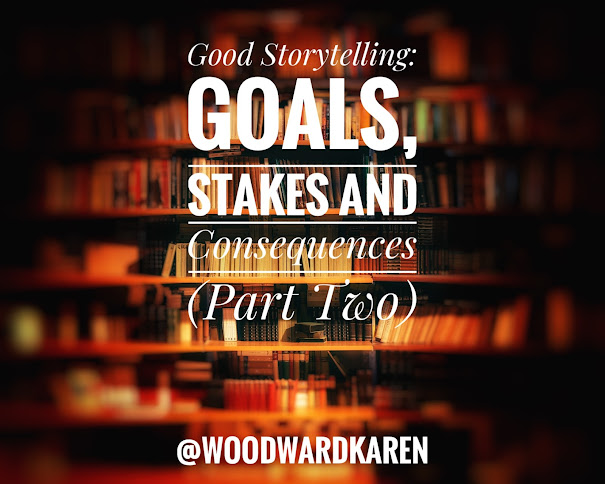Goals
The protagonist’s arc is also the arc of the story.
External Goals
All characters have external goals. In Raiders of the Lost Ark Indiana Jones's external goal was to obtain the Ark of the Covenant. He didn’t have an internal goal.
An external goal is something concrete, something you could take a picture of, something that exists in the external world independently of your character.
Internal Goals
Shrek, though, had both external and internal goals. His external goal was to get the fairytale creatures out of his swamp. His internal goal or challenge was to allow himself to be connected to others. In addition, there is tension between Shrek’s external and internal goals. He wants the fairytale critters out of his swamp because he is the ultimate loner, but his internal goal/challenge is to become more connected to others. His love for Princess Fiona is the concrete manifestation of that inner challenge.
An internal goal is usually a need or challenge that the character must meet or overcome. Usually it is the internal need or challenge that is met at the end of the B-story and that contributes to the epiphany that gets the character out of the All Hope is Lost moment and helps him formulate a new plan.
I’ll say more about all this later on, but I wanted to begin to introduce the ideas here.
One Goal to Rule Them All
A main character--like the real people they are a fiction of--can, and should, have more than one goal, but it must be clear they want one thing desperately and they must want it more than anything else. The thing that the protagonist passionately wants becomes the story goal. If the protagonist achieves the goal then she's succeeded, if not then she's failed.
For instance, in Raiders of the Lost Ark, if Indiana finds the ark and brings it back with him then he has succeeded. If not, he's failed.
What are the stakes? If Indy achieves his goal then he gets professional kudos and the opportunity to study a fascinating artifact. If he doesn't, then the Nazi war machine will use the ark to help turn the tide of war in its favor.
Of course, the goal can change along the way. In “The Firm,” Mitch McDeere starts out wanting to be a rich lawyer then, about halfway through the story, his goal changes: he just wants to be free, he doesn't want either the FBI or the mob to own him.
The stakes must matter to the characters
This seems obvious. If the stakes don't matter to a character that's like creating a beautiful car but neglecting to put gas in the engine.
Tying Stakes to Goals
The other day I was walking through a fairground and one of the hawkers called out to me:
"Hey! You wanna play this game? I know you do. It's fun and you could win a great prize."
"Oh?" I said. "What prize?"
The youth held up a big stuffed pink and green elephant.
No thanks. It would be cheaper--a lot cheaper--for me to go out and buy myself a stuffed elephant!
Now, if he'd held up the promise of a critique by, say, Stephen King I'd have played. Heck, he wouldn't have been able to get rid of me!
Why? Because the stakes, the possible consequences of a course of action--in this case winning a critique by Stephen King--are connected in the right way to my desire to become a better writer. That is, the stakes would help further my goal.
When the stakes help a character further their goal then the stakes will matter to your character.
Tying Stakes to Emotions
This is basically just another way of saying the same thing I just said, but it takes the topic from another direction.
This point about the stakes needing to matter to your characters is also about believability.
When the going gets tough and your character is getting beaten up, whether literally or figuratively, the character needs a believable reason for why they keep on keeping on.
How do you, as a storyteller, make it plausible that your characters will go through hell to achieve their goal? You make the stakes matter to the characters. Okay, but how do you do that? Simple: you tie the stakes into your character's wants and fears.
I think this is one reason why stakes are often life and death. Whether or not a person continues living matters a great deal to them and it doesn't need explanation. If a burglar pulls out a gun and points it at your character, the reader understands the character's panic.
-- --
Other posts in this extended series (I'm blogging a book):
How to Write a Genre Story: The Index
Where you can find me on the web:
Twitter: @WoodwardKaren
Pinterest: @karenjwoodward
Instagram: @KarenWoodwardWriter
YouTube: The Writer's Craft


No comments:
Post a Comment
Because of the number of bots leaving spam I had to prevent anonymous posting. My apologies. I do appreciate each and every comment.